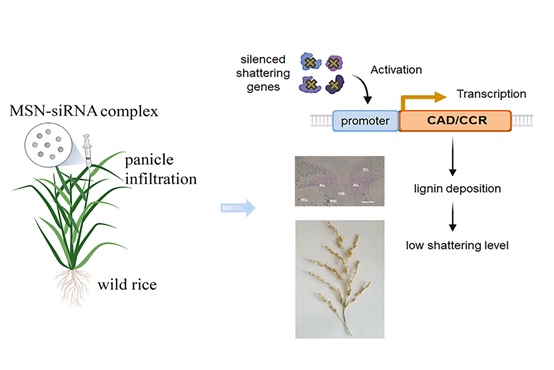The collaborative research team led by LI Jiayang from the Institute of Genetics and Developmental Biology (IGDB) of the Chinese Academy of Science, Yazhouwan National Laboratory, National Nanoscience Center, successfully used nanotechnology to significantly improve the seed shattering resistance of the wild allotetraploid rice (Oryza alta), bringing new insight for future rice breeding.
Wild rice O.alta is a kind of polyploid wild rice with CCDD genome, high biomass and strong stress resistance. However, the wild rice has a major drawback: strong seed shattering. In the past, scientists have tried to suppress key genes that control seed shattering through genetic engineering, such as gene knockout and gene editing. However, these methods often affect other development or growth of the plant.
To solve this challenge, the research team turned to nanotechnology. They used mesoporous silica nanoparticles (MSNs) as carriers to deliver small interfering RNA (siRNA) into the cells of wild rice. siRNA can specifically silence genes associated with seed shattering without permanent effects on other plant functions. They found that the expressions of the targeted genes were significantly reduced and the seed shattering was significantly improved. What is more exciting is that this method can target multiple genes at the same time and achieve the regulation of multiple genes.
This research provides a novel strategy for improving seed shattering in wild rice and may make an important contribution to improving rice yield and stability. Moreover, the use of nano-carriers for gene silencing avoids the defects of traditional genetic engineering, does not cause permanent changes to plant genomes, and meets the requirements for the safety of genetically modified crops.
This work was supported by the National Key R&D Program of China, the CAS Project for Young Scientists in Basic Research, and the National Natural Science Foundation of China.
Nanoparticle delivery systems improved seed shattering resistance in rice (Image by IDGB).
Contact:
Professor LI Jiayang
Institute of Genetics and Developmental Biology, Chinese Academy of Sciences
Email: jyli@genetics.ac.cn
 Nanoparticle delivery systems improved seed shattering resistance in rice (Image by IDGB).Contact:Professor LI JiayangInstitute of Genetics and Developmental Biology, Chinese Academy of SciencesEmail: jyli@genetics.ac.cn
Nanoparticle delivery systems improved seed shattering resistance in rice (Image by IDGB).Contact:Professor LI JiayangInstitute of Genetics and Developmental Biology, Chinese Academy of SciencesEmail: jyli@genetics.ac.cn CAS
CAS
 中文
中文




.png)
